- Home
- Jane Smiley
True Blue Page 7
True Blue Read online
Page 7
We walked down the valley, following the path that the cattle had trod. It wasn’t very steep. At the bottom, that valley turned (really, it was sort of a box canyon), and then we went over a very gentle ridge, and down again. Pretty soon, we could see the cattle in the distance, and then we came to the fence.
Mom said, “I think she needs a sling.”
I couldn’t disagree with her, because it was funny the way I still wouldn’t have said that my wrist hurt, but it did hurt. Every thought I had about it seemed a little slow, as if as soon as I had the thought, it was no longer true. I pressed my hand against my chest, as if I could get the pain to drain downward and run out my elbow somehow.
Mom said, “She’s breathing a little hard. Abby, do you want to get off and lie down again?”
I shook my head, then thought that I would like to, then looked down at the ground. The cattle and the horses had come through here, and it was a muddy mess—not like the hillside where I’d been sitting and fainting before. I shook my head, but that was a bad idea. Every place where I might lie down seemed really far away. Now Daddy and Lester were right next to me, and Daddy was leaning toward me, putting his hand out and touching my forehead. Then he gave me another drink of water. All of these things that were done and said jumped rather than flowed—one thing would be happening and then another, and I wouldn’t understand how one thing became the other. But I didn’t feel faint or weak. I said, “Let’s keep going.”
Mom said, a little more sharply, “Well, she needs a sling.”
Daddy took off his neckerchief, but it was a small one. We looked at it. That’s what it felt like—we just looked at it for a long time. Daddy said, “I could rip the other sleeve off this shirt, but I’m not sure that would be long enough, either.”
And then there were hoofbeats. I lifted my eyes and looked in that direction, which took a long time, too. The next thing that was happening was that Danny had taken the bandanna he was wearing, which was strangely bigger than Daddy’s and had been wrapped around his face against the dust of the cows, and I was bending down, and Danny was looping it over my neck, and then he helped me slip my arm into the fold. It rested there. It was okay.
Mom said, “Oh, honey. I think that did the trick. Thanks for—”
But Danny was like Daddy, and being thanked was not the sort of thing he liked, so he interrupted her and said, “Well, we got the cattle down to the water troughs, so we’re done with that, and I just got to wondering about you guys.”
He and Daddy coughed at the same time. Daddy said, “I was beginning to think this shirt was done for.”
Mom and Danny smiled.
Danny said, “The ranch house isn’t far from here, really. Just down along the lower fence line and around that stand of trees. There’s a little crick to cross, but …”
He walked on one side of me and Mom walked on the other. Dad and Lester went ahead to check out the terrain. Right then, I started to cry, but I didn’t know why. Mom and Danny pretended not to notice. I cried all the way down to the stand of trees, and then partway down to the house, just sniffling and dripping, and hiccupping every so often, and then I stopped crying. Happy was walking along nicely—I mean, she was pinned between Jefferson and Crockett, so what else could she do?—so I let go of the reins and wiped my face on my left sleeve and thought that I should probably have brought a bandanna myself.
When we got to the ranch house, Mr. Louis was happy to see us and kept saying, “What a girl! To ride all that way with a broken wrist! Good for you!” while all the time sorting out Happy and Lincoln and getting someone to bring a car around so he could drive me, Mom, and Daddy home. “Now, these horses can just stay in one of our corrals, by themselves, until you pick them up, or a couple of the boys can pony them home. We’ll give them plenty of hay. You get this girl to the hospital.”
It was dark by the time we were going through our own gate, and then Mom had to feed Spooky, and Daddy had to give Jack, Blue, Lincoln, Foxy, and Sprinkles their hay, and after that, we had to get to the hospital and wait in the emergency room and look at the X-ray (“Straight across the radius. Clean fracture, no displacement. Ulna’s okay. That’s a surprise, given how she fell, but you never know. Bones have their own opinions about things. We’ll just cast this and she’ll be right as rain in six weeks. No horseback riding, my girl; you just leave those equines alone. No baseball. No football. No jumping out of trees; that’s what I always tell the boys.”).
The cast ran from the first knuckle of my forefinger to just below my elbow, and it was sort of moist and cool. I had a sling, too—not Danny’s red bandanna, but a hideous enormous white thing. And I was not to take my arm out of the sling—positioning was important; none of this throwing my arm around hi, ho Silver and away! The doctor laughed at all his own jokes. When we got home, there was a bag on the table with a note from Mr. Louis, and inside it, three steaks from the barbecue and some baked potatoes and some baked beans and salad. It was late, but we were hungry, and so we went inside to the kitchen table and sat down. Mom had to cut my meat. I think that was when I realized that the next six weeks were going to be an enormous pain in the neck.
The next day was Sunday, and though we had to go a little early to set up chairs, it was not our turn to cook, which was a good thing, because I was tired from not sleeping very well. The break hurt and did not hurt—every time I decided that it hurt, then I thought of other things that had hurt more, like an earache I had for three days when I was seven and something my mom called a “migraine” that I got once from not eating breakfast. Every time I decided that it didn’t hurt, it would give me a throb or two. What with the sling and the throbs and the cast, one thing it did not let me do was forget about it.
All of the brothers and sisters were very nice, and, of all people, Brother Abner patted me on the head and said, “Little Abby, let me tell you a tale. When I was just your age, I was climbing on the roof of my house, the one we had back in Rochester, New York. Now, that house had a mansard roof. You know what that is?”
I shook my head.
“Well, that’s a roof that is real straight up and down in the lower part, and then flattens out on the upper part. My brother Levi and I were holding on to the chimney, right at the peak of the roof. We’d climbed out the attic window. And Levi said, ‘Ab, I dare you to go down to the gutter and come back up,’ and shoot, if I didn’t take that dare, just because it was Levi, and he was the older one and always making me remember that, and I slid off that roof, and I would have landed on my feet, maybe, but I tried to catch the gutter as I went past, so I landed upside down and broke my arm.”
I said, “I’m surprised you ever did anything naughty, Brother Abner.”
He leaned back in his seat and actually grinned, maybe the first time I had ever seen that, and he said, “Didn’t you realize, girl, that it’s the naughtiest ones who quest the most sincerely for redemption?”
I said, “No, sir, I didn’t realize that.”
He said, “Well, don’t tell ’em I told you.” He slapped his Bible on his knee and stood up.
Carlie Hollingsworth sat right next to me, in case I might need someone to turn the pages of my Bible. I could see by the way that she and her mom glanced at each other that her mom had put her up to this. I let it go on for a while, but finally I whispered, “I can do it. I’m fine,” and she moved her chair back to the normal spot. Carlie should have been better friends with me—she was about my age and we had known each other for as long as we could remember—but we never saw each other outside of church, since her family had to drive an hour from one direction to get to church, and we had to drive twenty minutes from the opposite direction. So I never saw Carlie when she wasn’t being a really good girl with great manners, and it was the same for her. I’m sure she wondered about me what I did about her—did she have any personality at all? And no, she would not have allowed Brad Greeley out of her sight.
The Greeleys were not there, either. At first I th
ought this was something of a relief. It wasn’t until we had our plates and were eating our supper that I realized that it meant something. In fact, it was the Greeleys’ second absence, since they hadn’t come Wednesday night, but the Wednesday night meeting was short, and not everyone came every week. But it was rare for people not to come on Sunday—today even the Goods were there. The last time the Greeleys had missed a Sunday was when both boys had the flu (because so many of the brothers and sisters were pretty old, it was important not to come if you were sick).
Our supper was good, but not my favorite—beef stew, with cabbage as a vegetable, which the older brothers and sisters just loved. There was also carrot and raisin salad, a big circle of lime Jell-O, and only some cookies for dessert. I could eat everything without having someone cut it for me, though. I was sitting there picking at this and that when I heard Sister Nicks say, “Maybe it’s just as well.”
I didn’t know what she was talking about until Sister Larkin said, “Quieter. I did notice the peace and quiet.”
Then Sister Hazen said, “Too quiet, if you ask me. Bunch of old people sitting around a room is too quiet.”
“Not everyone is old, sister,” said Sister Larkin.
“Too many are. A one-year-old and a three-year-old and a five-year-old lower the average considerably.”
The other two ladies chuckled and Sister Hazen said, “You think I’m joking, but it’s a sad joke. Jesus and his disciples were young men. They had energy and strength.” And then—I saw her—Sister Nicks pulled her two fingers across her lips, zipping them, and raised her eyebrows. Something about the Greeleys was not to be talked about.
Of course Carlie knew all about it—I asked her when we went around to the back of the mall to go to the girls’ room. The very first thing she said was, “Nobody blames you.”
“For what?”
“It was only a matter of time, my mom says.”
“What?”
“One of those Greeleys getting lost.”
“Oh.”
“You saw me.”
“What were you doing?”
“I was pretending not to see Brad throwing a fit. So you got stuck with him.”
“I don’t think he was throwing a fit.”
“Well, he was about to. And I just didn’t want to put up with it.”
“I wanted to get out of there anyway.”
I didn’t say why, but as we walked back to the hall, I thought how relaxed and happy Danny had seemed all day the day before, from the moment he saw us until the moment he put us in Mr. Louis’s car to go home. And that morning he had called and told Mom that he would be ponying Lester, Happy, and Jefferson home from Mr. Jordan’s ranch, and Mom hadn’t said a word about working on Sunday, or going to church, just, “Thanks, honey.”
I finished my supper, and got up to take my plate to the bin—every Sunday, one of the families that didn’t cook took the dishes and silverware home to wash it, and then brought it back the next Sunday.
Daddy and Mom talked about the Greeleys on the way home. I kept quiet in the backseat and listened to them. They didn’t actually mention the Greeleys by name, but I could tell. Mom said, “I hope they’re okay. It’s been a week.”
Daddy said, “I’m sure something came up. With little kids there’s always a sore throat or pinkeye or something. Don’t you remember when Abby was two and Danny was seven, and we all came down with the flu one right after the other? We didn’t go anywhere for three weeks.”
“Oh, goodness,” said Mom. “If we hadn’t been living near my parents, I don’t know what I would have done! You were so grumpy I had to set your breakfast outside the bedroom door and run.”
I smiled.
Daddy lowered his voice, but I heard him. “Abby just cried and cried. She must have had a terrible headache. I know I did.”
They shook their heads. I, of course, didn’t remember this, though I remembered other illnesses, like the measles.
We drove on.
Daddy said, “They should—”
“I know you think—”
“Well, maybe it was a wake-up call.”
Mom didn’t say anything.
Daddy said, “Too much yessing and don’t-worry-about-it. I said to Joe Hollingsworth that maybe if we had taken them aside two years ago when—” He coughed. “Anyway, I don’t see why everyone’s so shy about—” He coughed again. “It’s our responsibility to our flock to counsel them on important issues, and not every important issue is a question of doctrine.”
We drove on. I wanted to hear what Mom had to say, but my eyes were closing.
Dad said, “I think I need to call an elders’ meeting.”
All Mom said was, “Mark, trying to tell other people how to rear their kids is very thin ice. You know, it is so thin I can see through it.”
I smiled.
Saddle Strings
Tapaderos with Stirrups
Chapter 9
OF COURSE I COULDN’T RIDE. THAT DIDN’T HIT ME UNTIL I GOT home Monday afternoon, after a whole day of there being plenty of things that were hard, like carrying my books, taking notes in class, eating lunch, and sitting through tennis while they figured out what else I might do during physical education period, not to mention saying over and over, “Yes, I fell off a horse. Saturday afternoon, at a cattle drive. No, it doesn’t hurt that badly, thanks. The doctor says six weeks.” If the person I was talking to was an adult, I would have to add, “Yes, it could have been a lot worse.” Most of the kids just stared, and I thought, Gee, it’s a broken arm! Ed Harding broke his arm last fall! What’s the big deal? I was not in a good mood by the time I’d dropped my books both getting on the bus and getting off, but then when I walked into the house, there was the worst thing—no riding. What was left, only homework?
Mom was upstairs when I came in, but Spooky was staring at me from his little box. I sat down on the floor and petted him with my forefinger on the top of his head. His eyes were wide open and very bright. After I’d petted him maybe three times, he grabbed my finger with his front paws and wrestled it to the ground, so I reached over and picked up a toy Mom had made him by putting a row of tight knots in an old rag. I snaked the toy around the box, and at first, Spooky bounced backward as though he’d never seen such a thing before, and then he leapt high in the air (maybe four inches) and landed on one of the knots. I let go, and he shook it until he was sure it was dead, then he looked at me and jumped back as if he’d never seen me, either. I laughed out loud, my first good laugh of the day. Mom came downstairs. She leaned down where I was sitting and kissed me on the top of the head and said, “I wanted to talk to you about six times today and see how you were doing.”
I said, “It’s more boring than painful.”
She said, “Try to think of that as good. Want a snack? I made some brownies.”
I knew she had made them for me. I got up, which was awkward (you don’t realize what you use a particular hand for until it’s not there to use), and went into the kitchen. Out the window, of course, I could see Jack and Jefferson and Lincoln in the gelding pasture, Happy, Foxy, Sprinkles, and Amazon in the mare pasture, and Blue looking out of his stall through the door of the barn. Everyone was doing something—Jack and Jefferson were having a bit of an argument, Lincoln was taking a drink, Amazon was off in the corner of the mare pasture with Happy, Sprinkles was looking for strands of hay on the ground, and Foxy was playing with the gate chain. Some horses are very intent upon figuring out locks, and Foxy was one of those, but the chain was loose and had a snap, so she hadn’t managed to understand it yet. Rusty was up the hill behind the gelding pasture, investigating something. She finished her business, whatever it was, then sat, facing down the hill, and surveyed her kingdom, or queendom. Only Blue was staring toward the house. If I hadn’t known better, I would have said that he was looking at me through the window. But I knew better. I picked up a brownie. No nuts. I liked that. Mom poured me a glass of milk.
She said, �
�I rode Lincoln and Jefferson. Your dad rode the others.” She looked out the window. “Except Blue. He’ll ride Blue before supper. He wanted you to be there.”
I nodded.
“We’ll figure something out.”
I nodded.
She said, “I just wish I could ride better and be more help. Maybe I can ride Foxy a bit.”
“I could watch you. I used her for Barbie. She was okay.”
“It’s a short way to the ground.”
I sighed. My problem was not that the horses would not get ridden. It was that I would die of boredom. I looked at the kitchen clock. Two and a half hours until supper. I had a second brownie and finished my milk, then changed, awkwardly, into my jeans and went to the barn. As soon as I got out among the horses, my wrist, which had been okay all day, began to throb. It was like it had a mind of its own. And it itched, too. I kept wanting to stick something down the cast and scratch the itch, but I didn’t have anything, and I was a little afraid to.
I went to the gelding pasture, and Jack and Jefferson came to the gate. Jack immediately looked into my hands, to see if I had anything, but he didn’t push at me. He sniffed the sling and the cast, especially the cast, for at least a minute. His ears flopped a little in perplexity, but then he decided that it was not understandable, but also not worth any further investigation. While he was doing this, I stroked the side of his head. Jefferson looked at the cast, too, but he was not as naturally curious as Jack, so he only gave it one sniff before giving up on treats and wandering away.
I got up on the gate and leaned over it, anchoring myself with my left elbow and patting Jack down the side of his neck. He was fourteen months old now, and his mane and tail were those of a grown-up horse, at least in texture. His tail was thick and had grown out almost to his hocks. His mane actually needed to be thinned, but since it was still rainy season, we left it thick so he could use it to let the rain run off. Same with his forelock, which was so thick now that you couldn’t always see the cowlick in the middle of it. There’d been a time I hated that cowlick, because I thought that it meant for sure that the real owners of the mare who was his dam (and had a similar cowlick) would take him away from us, but they didn’t do that—every time we heard from them, they were very nice (“How’s Jack? Send us a picture when you get a chance. Wish you could come for a visit and see the ranch in Texas. Maybe in the summer.”). He still loved to run, especially when Jefferson would run with him. Just then, I thought maybe I would turn him out with Happy, which we’d never done because Daddy didn’t believe in turning mares and geldings out together. But I thought she would be more likely to play with him and give him something to do.

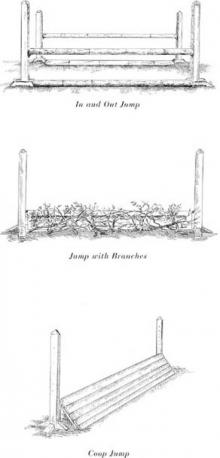 The Georges and the Jewels
The Georges and the Jewels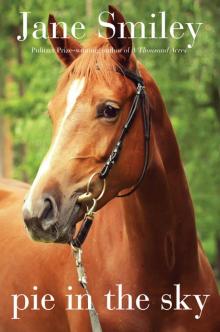 Pie in the Sky: Book Four of the Horses of Oak Valley Ranch
Pie in the Sky: Book Four of the Horses of Oak Valley Ranch Duplicate Keys
Duplicate Keys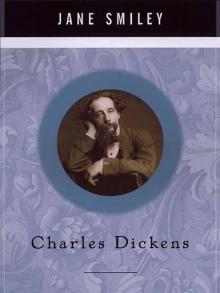 Charles Dickens
Charles Dickens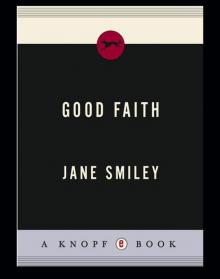 Good Faith
Good Faith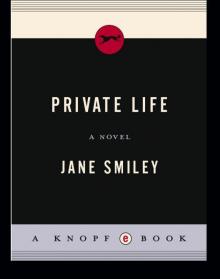 Private Life
Private Life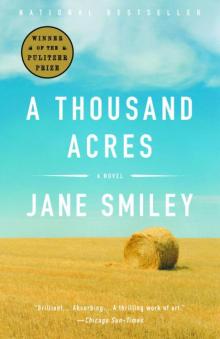 A Thousand Acres: A Novel
A Thousand Acres: A Novel The Greenlanders
The Greenlanders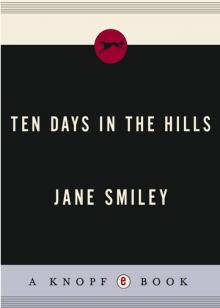 Ten Days in the Hills
Ten Days in the Hills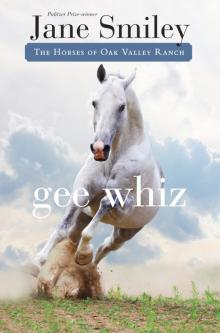 Gee Whiz: Book Five of the Horses of Oak Valley Ranch
Gee Whiz: Book Five of the Horses of Oak Valley Ranch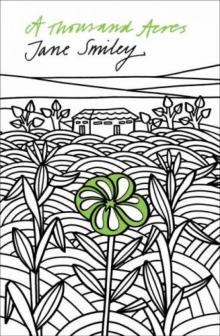 A Thousand Acres
A Thousand Acres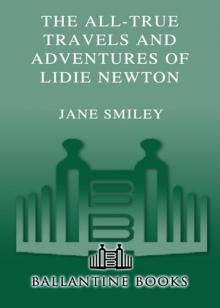 The All-True Travels and Adventures of Lidie Newton
The All-True Travels and Adventures of Lidie Newton Ordinary Love and Good Will
Ordinary Love and Good Will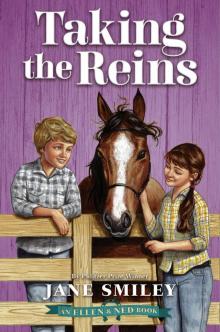 Taking the Reins (An Ellen & Ned Book)
Taking the Reins (An Ellen & Ned Book)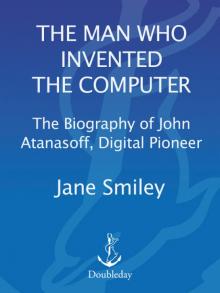 The Man Who Invented the Computer
The Man Who Invented the Computer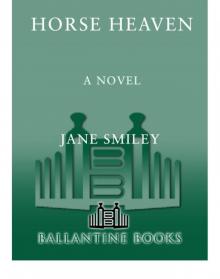 Horse Heaven
Horse Heaven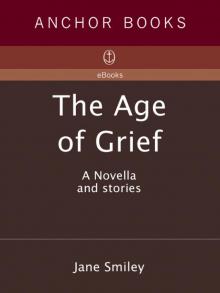 The Age of Grief
The Age of Grief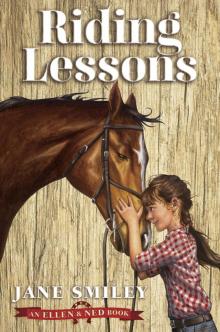 Riding Lessons
Riding Lessons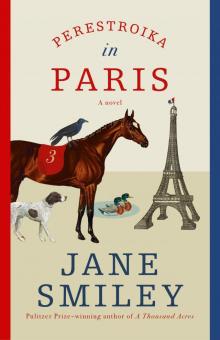 Perestroika in Paris
Perestroika in Paris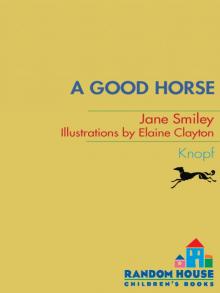 A Good Horse: Book Two of the Horses of Oak Valley Ranch
A Good Horse: Book Two of the Horses of Oak Valley Ranch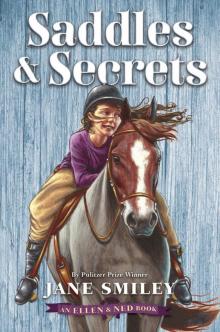 Saddles & Secrets (An Ellen & Ned Book)
Saddles & Secrets (An Ellen & Ned Book)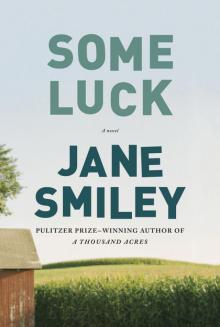 Some Luck: A Novel
Some Luck: A Novel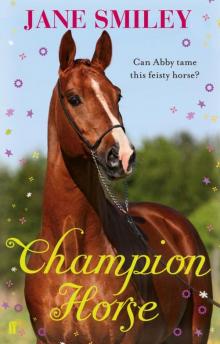 Champion Horse
Champion Horse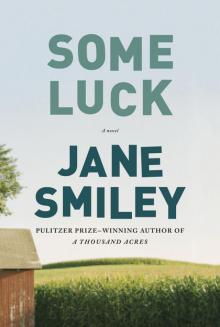 Some Luck
Some Luck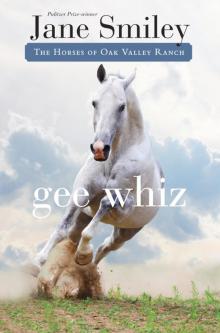 Gee Whiz
Gee Whiz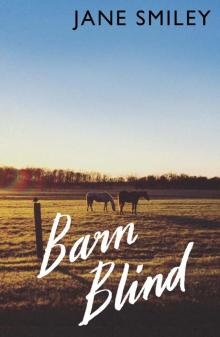 Barn Blind
Barn Blind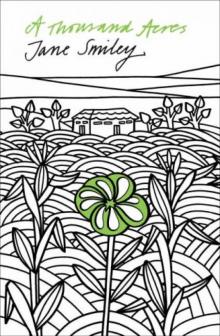 A Thousand Acres (1992 Pulitzer Prize)
A Thousand Acres (1992 Pulitzer Prize)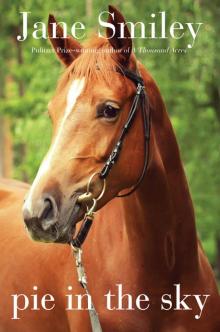 Pie in the Sky
Pie in the Sky True Blue
True Blue A Thousand Acres_A Novel
A Thousand Acres_A Novel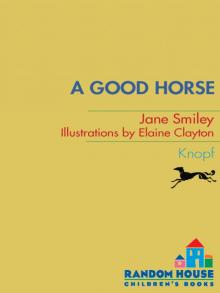 A Good Horse
A Good Horse